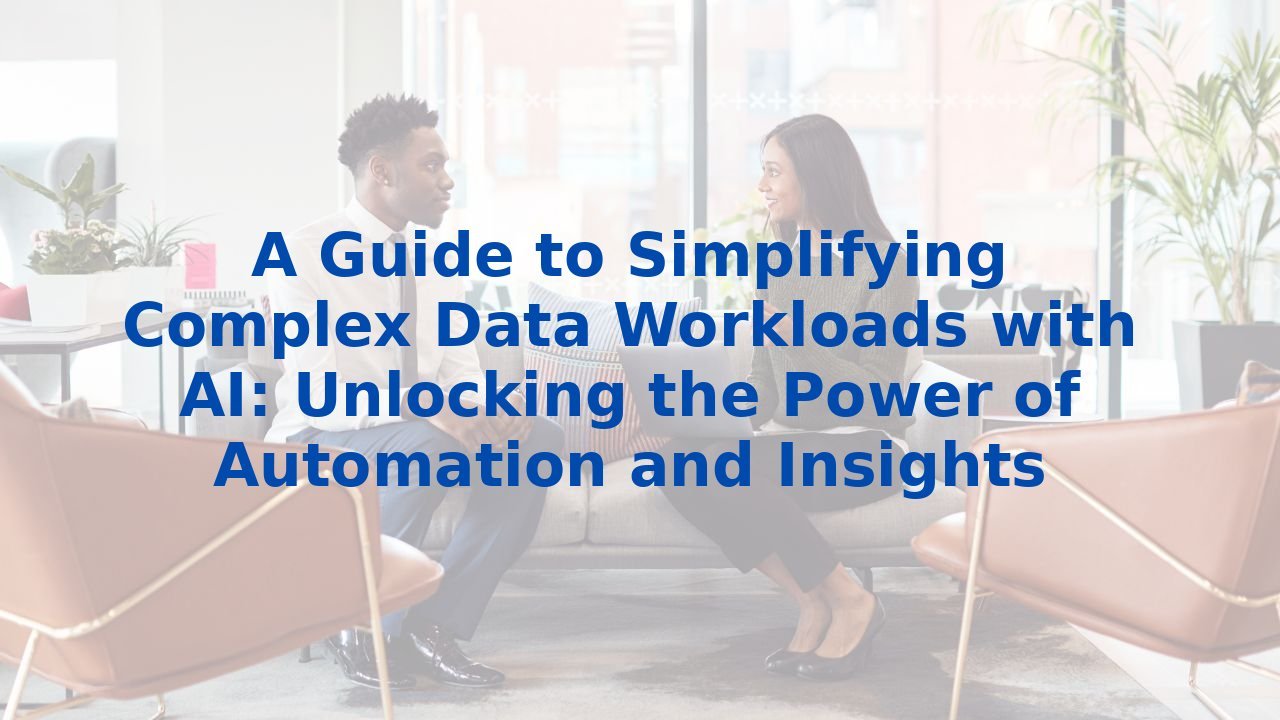A Guide to Simplifying Complex Data Workloads with AI: Unlocking the Power of Automation and Insights
A Guide to Simplifying Complex Data Workloads with AI: Unlocking the Power of Automation and Insights
Introduction
In a world where speed and efficiency define success, businesses are relentlessly pursuing ways to optimize operations. Enter Artificial Intelligence (AI), a transformative force that can redefine how organizations handle complex data workloads. This post delves into the mechanisms through which AI can simplify daunting tasks, illuminate insights, and streamline business processes—all while enhancing overall efficiency.
Understanding AI in Business Process Management
The concept of AI in business process management revolves around harnessing advanced technologies to analyze, automate, and optimize workflows. By automating repetitive tasks and enabling rapid data analysis, organizations not only boost operational efficiency but also foster a culture of continuous improvement.
Enhancing Data Operations with AI
Data Analysis and Visualization
Imagine the capability to sift through mountains of data in seconds, discovering patterns and trends that would otherwise remain hidden. With AI, businesses can dramatically accelerate data analysis, leading to faster, more informed decision-making. This means identifying root causes of issues or predicting future outcomes based on historical data—transformative insights essential for thriving in today's market.
Process Automation
Gone are the days of tedious manual tasks. AI facilitates a paradigm shift through process automation. For example, intelligent document processing can convert unstructured data into actionable formats without human involvement. What would have taken hours or days can now be accomplished in mere moments, driving significant productivity gains.
Predictive Insights
Imagine having a crystal ball that forecasts customer behavior or market trends. While that’s not entirely feasible, AI's predictive analytics come remarkably close. By identifying trends and patterns, AI equips businesses to set optimal pricing, allocate resources effectively, and ultimately, stay one step ahead of their competition.
Real-Time Monitoring
The beauty of AI lies in its ability to monitor processes in real time. This feature allows organizations to promptly identify potential issues, minimizing risks and enabling rapid problem-solving. The proactive nature of AI transforms how businesses manage operations, leading to enhanced efficiency and reduced downtime.
Improving Specific Business Processes with AI
Customer Service
AI is revolutionizing customer service by automating routine inquiries and providing actionable insights from customer feedback. Chatbots are an excellent example, handling basic queries and freeing human agents to focus on more complex issues. This not only enhances response times but also improves customer satisfaction.
Sales and Marketing
With AI analytics embedded in Customer Relationship Management (CRM) solutions, businesses can discern which clients offer the highest revenue potential. Additionally, AI-driven chatbots ensure that customers receive immediate assistance, reducing wait times and potentially increasing sales through timely, personalized engagement.
Product Development
AI has seeped into product development, making it more innovative and cost-effective. Generative design tools can produce numerous variations of a design idea, expediting the development process and minimizing costs associated with traditional prototyping.
Human Resources
AI tools streamline HR functions, from refining recruitment processes to facilitating objective salary negotiations. By consolidating various data points, organizations can make informed decisions that benefit both the employer and the employee, while reducing the time spent in hiring cycles.
The Benefits of Employee Training for AI
Though AI stands as a formidable tool, its true potential is unlocked through effective employee training. Investing in your workforce yields substantial dividends:
- Enhanced Productivity: Trained employees can utilize AI tools more efficiently, allowing them to shift focus from mundane tasks to strategic initiatives that drive growth.
- Improved Decision-Making: Familiarity with AI enhances employees’ abilities to analyze data swiftly, leading to more informed decisions that contribute to business success.
- Adaptability: A workforce educated in AI remains flexible, seamlessly integrating new technologies as they emerge.
- Reduced Errors: Training minimizes implementation errors, ensuring processes stay optimized without introducing new inefficiencies.
Conclusion
AI is not just another tool in the toolbox; it’s a transformative force that reshapes how organizations tackle complex data workloads and refine business processes. From data analysis to customer service, the benefits of integrating AI are profound. However, to truly harness this technological prowess, organizations must prioritize training their employees. By doing so, they position themselves for remarkable productivity gains, informed decision-making, and a resilient operational framework. The future belongs to those willing to adapt, learn, and evolve.
To explore comprehensive AI training solutions that can empower your workforce, visit Complete AI Training.



